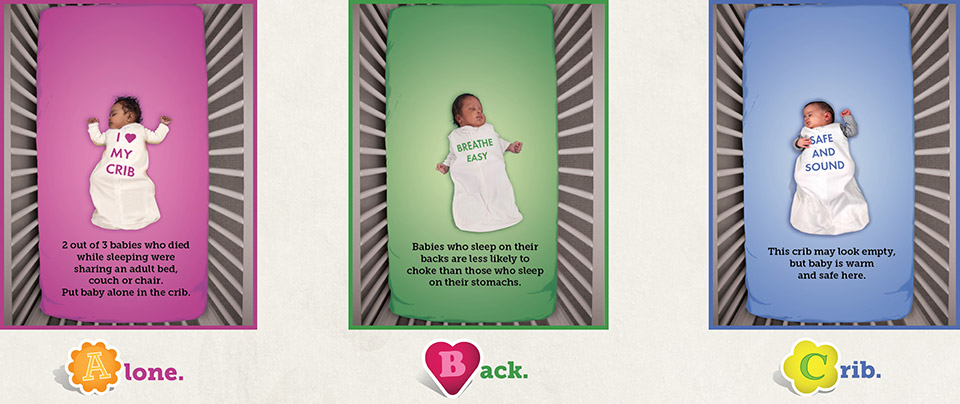
Sudden Infant Death Syndrome (SIDS)
Prevention Recommendations and Healthy Awake Positions
Important Information You Should Know

What is Sudden Infant Death Syndrome (SIDS)?
Sudden Infant Death Syndrome (SIDS) is the name given to the sudden and unexplained death of a healthy baby who is put down to sleep and later found dead with no obvious cause. It is the leading cause of death in babies between 1 month and 12 months of age. A higher risk of SIDS is seen in babies 2 to 6 months of age and SIDS occurs more often in boys than in girls.
What Causes Sudden Infant Death Syndrome (SIDS)?
There is no known cause as to why SIDS happens.
How Can Babies Be Protected From the Risk of SIDS?
Even though there is no known cause, there are actions you can take to lower the risk of SIDS:
• "BACK TO SLEEP." Infants should always be placed on their backs for every sleep and nap.
• Babies should sleep in their own cribs or bassinets that are within reach of your bed. Bed sharing during sleep is not recommended.
• Use a firm sleep surface. A firm crib mattress, covered by a sheet, is the recommended sleeping surface. This is called "bare naked crib."
• Keep soft objects and loose bedding out of the crib. Pillows, quilts, comforters, sheepskins, crib bumpers, stuffed toys and other soft objects should be kept out of an infant's sleeping environment.
• If a blanket is used to keep the baby warm, it should be a thin blanket and only cover the baby to the height of the chest. The blanket should be kept below the level of the baby's arms and tucked into the sides and bottom of the crib mattress to keep secure.
• Keep your baby away from second-hand smoke. Smoke increases an infant risk of SIDS as well as other health problems.
• Consider offering a pacifier at nap time and bedtime after your baby is 1 month old. The pacifier should be used when placing the infant down for sleep or a nap and not be reinserted once the infant falls asleep.
• Avoid overheating. The infant should be lightly clothed for sleep, and the bedroom temperature should be kept at what would be considered comfortable for a lightly clothed adult.
• Avoid commercial devices marketed to reduce the risk of SIDS. Although various devices have been developed to maintain sleep position or reduce the risk of aspiration, none have been tested sufficiently to show efficacy or safety.
• Assure that others caring for the infant (child care provider, grandparent or other relative, friend, and babysitter) are aware of these recommendations.
What are Healthy Awake Positions?
Avoid development of positional plagiocephaly (flat back of head). Encourage "tummy time" while awake and being supervised. Remember "tummy time" is for play and back is for sleep.
Avoid having the infant spend excessive time in car-seat carriers and "bouncers." Place the infant to sleep with his/her head facing one side of the crib for a week and then facing the other side of the crib the next week.
More Information:
For even more information about Sudden Infant Death Sydrome (SIDS) please review our Sudden Infant Death Sydrome (SIDS) information packet.

© Copyright 1995-2023 The Cleveland Clinic Foundation. All rights reserved.
This information is provided by the Cleveland Clinic and is not intended to replace the medical advice of your doctor or health care provider. Please consult your health care provider for advice about a specific medical condition. For additional health information, please contact the Center for Consumer Health Information at the Cleveland Clinic (216) 444-3771 ☎ or toll-free (800) 223-2273 ☎ extension 43771. If you prefer, you may visit http://www.clevelandclinic.org/health/ or http://www.clevelandclinic florida.org.
Healthy Community Initiative (HCI):
#HealthyCommunitiesInitiative
The Healthy Community Initiative is a collaborative effort between Cleveland Clinic and community partners to promote optimal health and wellness. Based on the community health needs assessment and utilizing combined resources within our local communities, Healthy Community Initiative programs will be customized around three core areas: education, nutrition and physical activity.
Live Long Lyndhurst Health and Wellness Initiative (HWI):
#LiveLongLyndhurst
Live Long Lyndhurst is a Health and Wellness Initiative between the City of Lyndhurst, Cleveland Clinic Community Outreach, Legacy Village, Cleveland Metroparks at Acacia, The Fedeli Group, the YMCA, South Euclid - Lyndhurst Schools, Second Sole and Anthem BlueCross BlueShield.
Related:
➤ Hillcrest Family YMCA
➤ Legacy Village
➤ Live Long Lyndhurst
➤ South Euclid - Lyndhurst Schools
|